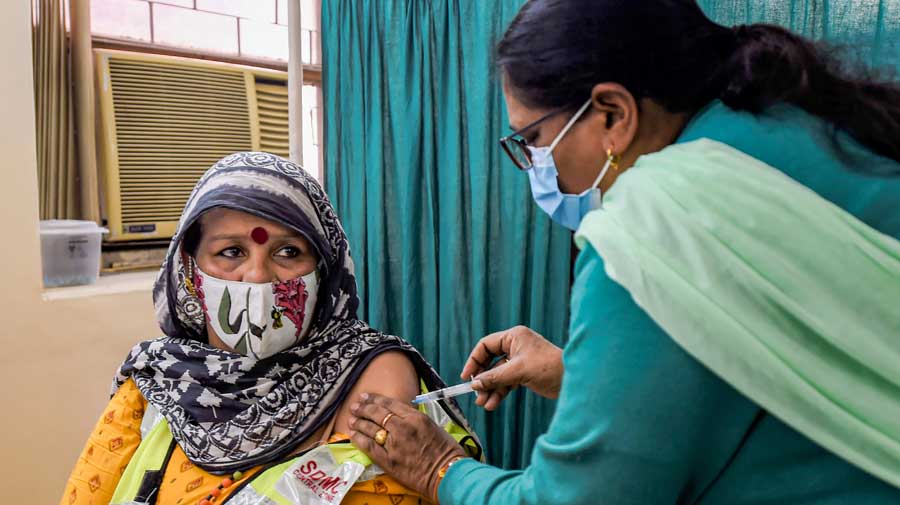Covid vaccines will be offered from March 1 to all people aged above 60 and those older than 45 years with chronic health disorders, the Centre has said.
The vaccines will be free in government hospitals. Recipients who opt for vaccinations in private hospitals will need to pay, Union information and broadcasting minister Prakash Javadekar said, announcing decisions taken by the cabinet on Wednesday.
The Centre is procuring Covishield at Rs 200 a dose and Covaxin at Rs 295 a dose but analysts believe the cost in the private sector will be higher. Two doses of a vaccine are needed for protection.
Adar Poonawala, the CEO of Serum Institute that makes Covishield in India, was quoted on January 12 as saying the company would sell the vaccine in the private market at Rs 1,000. Bharat Biotech, which makes the home-grown Covaxin, has so far not signalled a price for its vaccine in the private market.
The vaccines will be available through 10,000 government hospitals and nearly 20,000 private hospitals, Javadekar said. “Those who want the vaccines from private hospitals will have to pay — what amount is to be paid will be announced by the health ministry within three or four days,” he said.
This is the first time the Centre has announced an option for people to pay for Covid-19 vaccines although experts say Prime Minister Narendra Modi had on January 11 hinted at this possibility when he asserted that the Centre would bear expenses for the first phase of the campaign to inoculate healthcare and frontline workers.
Some might view the pay-if-you-wish option as a departure — at least for the people of Bihar — from a promise made by Union finance minister Nirmala Sitharaman in October while she was campaigning ahead of the Bihar Assembly elections.
Sitharaman had said that when scientists approve the vaccine and large-scale production in the country begins, “in Bihar, every person will get a free vaccine... this is our first manifesto promise”. If every person in Bihar goes to a government hospital, he or she will get the vaccine free but those who go to private hospitals can say better clarity should have been provided by the minister before the polls.
Experts said the health ministry was yet to disclose the process through which potential beneficiaries could register themselves on the digital platform called Co-Win to receive the vaccines and the eligibility criteria for comorbidities or chronic health disorders.
Since its start on January 16, the campaign’s first phase — focused only on high-risk priority populations — has inoculated more than 6.5 million healthcare workers and over 4.3 million frontline workers with first doses of vaccines.
The second phase starting on March 1 will extend the campaign to vulnerable priority groups from the general population — the elderly and those with comorbidities — and is expected to rapidly expand the fraction of India’s population protected from the coronavirus.
Experts expect the second phase of the vaccination campaign to significantly speed up coverage as the first phase had involved around 10,000 hospitals, including 2,000 private facilities.
Although starting with people older than 60 and those above 45 with comorbidities, the second phase seeks to eventually immunise all people older than 50 and those below 50 with comorbidities, an estimated 270 million people.
High blood pressure, diabetes and cardiovascular and kidney diseases are among the list of comorbidities, said a senior doctor who helped draft the list.
Javadekar said the health ministry would announce the costs of vaccines in the private sector after discussions with the vaccine manufacturers and representatives of participating hospitals.
Sections of doctors have hailed the cabinet decision saying it would allow the government to focus on providing vaccines to those who cannot afford them while allowing those who can pay to purchase them.
The Centre has so far remained silent about the issue of choice of vaccines. During the campaign’s first phase, neither healthcare workers nor frontline workers had a choice of vaccines.
A third Covid-19 vaccine — the Russian-made Sputnik V — could also become available in the coming weeks if India’s drug regulatory authority is satisfied with its trial data. Egypt on Wednesday became the 35th country to approve Sputnik V.
India would need roughly 540 million doses to vaccinate the 270 million people in the vulnerable priority groups. Serum has indicated that it has a production capacity of 70 million doses a month while Bharat has said it would have 10 million doses ready by February 2021 and could supply 200 to 500 million doses during 2021.
The Centre said on Wednesday it had sent public health teams to Bengal and nine other states to determine the reasons for the recent upsurge in some states and guide state health authorities for required control measures.
The three-member teams will examine the status of the epidemics in Bengal, Chhattisgarh, Gujarat, Jammu and Kashmir, Karnataka, Kerala, Madhya Pradesh, Maharashtra, Punjab and Tamil Nadu.
The Union health ministry said it had also written to Maharashtra, Chhattisgarh, Gujarat, Jammu and Kashmir, Kerala, Madhya Pradesh and Punjab to undertake aggressive public health measures to break the chain of transmission. The states have been asked to flush out undetected cases, increase the number of PCR tests, and ensure that all positive persons receive appropriate clinical management.
The average daily cases have more than doubled in Maharashtra over the past two weeks — from 2,692 on February 10 to 6,110 on February 23 — and increased in Chhattisgarh, Madhya Pradesh and Punjab.











